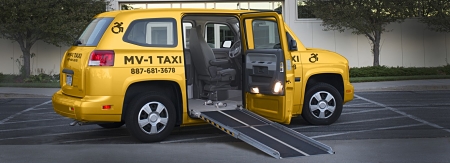Nissan’s NV200 taxi, dubbed the Taxi of Tomorrow, is the only approved non-hybrid taxi for New York City but a competitor has emerged.

Mobility Ventures, the company behind the wheelchair-accessible MV-1 car, is hoping to entice cab buyers away from the Taxi of Tomorrow by slashing the price of its vehicle from $39,000 to $33,000 to compete with the NV200.
Coupled with a $14,000 rebate from the Taxi and Limousine Commission (TLC) to get more accessible cabs on the road, the price drops to $19,000, $10,000 less than Nissan’s taxi.
Pat Kemp, an executive at MV1, said in a statement that the price cut makes the cab the “best choice for taxi drivers and fleet owners now making the switch to a wheelchair accessible vehicle.”
But Nissan defended the Taxi of Tomorrow, saying the design is the result of extensive outreach to the cab industry and riders.
"Nissan's NV200 Taxi is New York City's only approved non-hybrid taxi and it reflects the input of hundreds of taxi owners and drivers, and thousands of passengers from all walks of life,” Nissan said. “Nissan understands and respects the concerns presented by disability advocates and the NV200 Taxi is designed so that it can be modified for wheelchair users.”
Based on the TLC Taxi of Tomorrow guidelines, Nissan NV200 Taxi will be the sole option for Manhattan yellow taxis not being replaced by a hybrid or an alternate wheelchair-accessible vehicle (WAV) where additional choice among competitors is maintained. Nissan is working with BraunAbility, the global leader in automotive mobility, to provide WAV Nissan NV200 Taxis, which now are available for purchase.
More than 500 Nissan NV200 taxis already are in service in New York City. The Nissan NV200 Taxi has more content specifically tailored to use as a New York City cab than any vehicle prior to it including important safety features.
The Nissan NV200 taxi is the only taxi that leaves the factory with the installed partition, which has been specifically designed to ensure that no safety features are compromised by after-market installations. In fact, the Nissan NV200 Taxi was crash-tested with the partition and meets Federal safety standards, an attribute no other automaker provides for taxis. After-market installations in some taxis can render safety features such as airbags non-functional.
The Nissan NV200 also meets global pedestrian-protection standards aimed at softening the impact to a pedestrian if struck by a vehicle.
Following its selection as the exclusive Taxi of Tomorrow provider, Nissan engaged with organizations long at the forefront of the Taxi of Tomorrow program, including the Design Trust for Public Space, Smart Design and the Cooper-Hewitt National Design Museum.
Nissan created its own “New York Ave” at its Arizona proving grounds to replicate harsh conditions of NYC streets to rigorously test the Nissan NV200 taxi to tune the suspension specifically to NYC road conditions. Additionally, Nissan hired New York City cab drivers to test vehicles around the city, collecting data that was used to refine the vehicle. In total, these drivers logged enough miles to cover every street in Manhattan more than 300 times.
TLC spokesman Allan Fromberg said the agency is just pleased that there’s competition to get more accessible cars on the road.
“The TLC welcomes and appreciates all efforts by the private sector to support greater wheelchair accessibility in New York City's taxi fleet,” he said.
Half of the yellow cab fleet, or more than 7,500 cars, must be wheelchair accessible by 2020 under a settlement between the administration of Mayor Michael Bloomberg and the United Spinal Association.
Mobility Ventures’ MV-1 Empire Taxi a specially designed version of the company's MV-1 that provides more legroom and luggage space than any other taxi vehicle operating in New York City – and is fully wheelchair accessible.
Under Mobility Ventures' "MV-1 Empire Taxi" program, for the first 25 drivers who purchase the vehicle, the company will match the TLC's 50 cents for every pick up in an MV-1.
Drivers are eligible for $7800 in annual payments from the combined program for driving an "MV-1 Empire Taxi" based on an expected 150 rides per week.
"The unmatched safety, reliability and ease of use of the 'MV-1 Empire Taxi', combined with this new incentive program, makes it the best choice for taxi drivers and fleet owners now making the switch to a wheelchair accessible vehicle," said Pat Kemp, executive vice president, Mobility Ventures.
